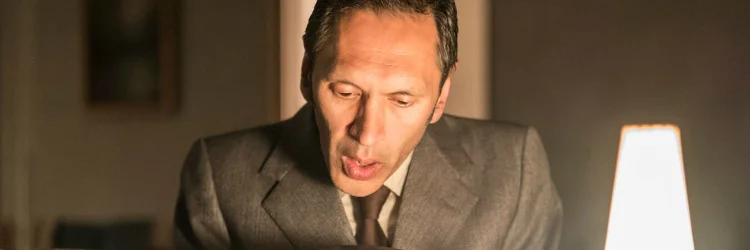Review - Anna at the National Theatre
It is 1968, and in a Plattenbau apartment in East Berlin, Anna and her husband Hans are
hosting a party to celebrate his promotion. Despite the strict regulations of Soviet rule and a culture of mass surveillance, tonight there is laughter, toasting and even chocolate cake. But the sight of Hans' new boss unlocks terrible ghosts from Anna's past, threatening the life she and Hans are trying to build for themselves in an uncertain time.
Ella Hickson's script, rich with moral ambiguity and questions of freedom, duty and love, is brought to thrilling life in this production. In the intimate Dorfman Theatre, director Natalie Abrahami evokes the feeling of life behind the Wall, where it was the job of the Stasi to know everything about everyone. Every seat is equipped with a pair of headphones, and Vicki Mortimer's set - a comfortable, modest apartment living room - is built behind a glass pane, as though we were looking in through the window. So the only way to hear is to eavesdrop.
Everything about Anna is claustrophobic: the set, confined to the four walls of a high-rise apartment; the fact that everything takes place over a single evening; the intense clarity of the sounds coming through the headphones.
This is quite disorienting at first. Noises creep in unexpectedly from every angle. Even when Anna is offstage, we trace her movements by the sounds of her footsteps, the rustling of clothes, the desperate lighting of a cigarette. It is a great technical achievement by sound designers Ben and Max Ringham, and something quite unique to create a whole aural landscape so that even as our eyes see one scene, we are imagining another.
The whole production conspires to foster suspicion, and Jon Clark's lighting design serves to conceal as much as to illuminate. The apartments lamps are turned on gradually, leaving the audience in a permanent state of unease, as though something or someone might be lurking in the shadows. At one moment, the lights go out completely, and the vivid sounds of Anna's stumbling and terrified breathing are our only reference.
The drama escalates quickly. One hour is not much time do allow the plot and the tortured pasts of these characters to unfold, and Anna's descent into drunken hysteria does feel quite accelerated. But the performances are strong, and Phoebe Fox as Anna conveys both the fortitude and the vulnerability of a person scarred by childhood horrors during the occupation of Germany. Paul Bazely's Hans is a far more passive figure, and a reminder of the necessity of compliance during the communist regime, with Christian Neumann (Max Bennett) an unnerving symbol of the power of the state.
Amidst the duplicitousness of who knows what about whom, some of the particularities of the plot become confused, particularly at the end of the play. But this production creates an impressively unique experience with its tinny soundtrack of domestic surveillance; one that feels at once innovative and new, and completely of the Cold War era.
Anna is in the Dorfman at the National Theatre until 15th June.
Originally published on
